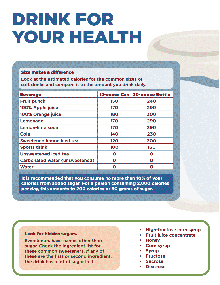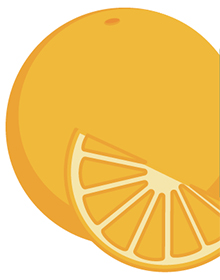Editor’s note
You can read this publication on this page or download the PDF.
See the companion publication N1024, Drink to Your Health Poster.

This handout highlights key messages of the dietary guidelines, including drinking more water and avoiding sugar in beverages.
Topics
- Nutrition
- Health
- Beverages
- Energy drinks
- Soda pop
- Soft drinks
- Sports drinks
- SNAP
Pages
The printed version is a two-page 8.5-by-11 inch handout.
See handout content below.
Drink For Your Health
Size makes a difference
Look at the estimated calories for the common sizes of soft drinks and compare to the amount you drink daily.
| Beverage | 12-ounce can | 20-ounce can |
|---|---|---|
| Fruit punch | 150 | 240 |
| 100% apple juice | 170 | 290 |
| 100% orange juice | 180 | 300 |
| Lemonade | 170 | 290 |
| Lemon-lime soda | 170 | 290 |
| Cola | 140 | 230 |
| Sweetened lemon iced tea | 120 | 200 |
| Sports drink | 100 | 160 |
| Unsweetened iced tea | 0 | 0 |
| Carbonated water (unsweetened) | 0 | 0 |
| Water | 0 | 0 |
It is recommended that you consume no more than 10% of your calories from added sugar. For a person consuming 2,000 calories per day, this amounts to 200 calories or 50 grams of sugar.
Look for hidden sugars.
Sweeteners have names other than sugar. Check the ingredient list for these common sweeteners. If any of these are the first or second ingredient, the drink has a lot of sugar in it.
- High-fructose corn syrup
- Fruit juice concentrate
- Honey
- Corn syrup
- Syrup
- Fructose
- Sucrose
- Dextrose
But it’s just coffee.
Whole milk and flavored syrups can add hidden fat and sugar calories to your coffee beverage. Ask for your drink to be made with fat-free milk rather than whole milk to reduce the fat. Skip the extra sugar calories that flavored syrups add.
What’s the buzz on energy drinks?
The energy comes from stimulants such as caffeine, guarana, ginseng and sugar.
Negative effects of energy drinks
- Difficulty sleeping
- Irritability
- Increased heart rate
- Nervousness
- Increased blood pressure
Sports drinks and soft drinks:
- Contain large amounts of added sugar and calories
- May spoil your appetite
- Can cause tooth decay
- Can increase calorie intake that leads to weight gain
Choose whole fruit over juice
| 1 orange | 12 ounces orange juice |
| 60 calories | 165 calories |
| 12 g sugar | 31 g sugar |
| 4 g fiber | 0 g fiber |

Oranges and 100% orange juice have natural sugar that accounts for most of the calories. While the juice does provide beneficial vitamin C, the calories can add up fast. The fiber in the whole orange helps you feel full. You get more overall nutritional value by eating the orange.